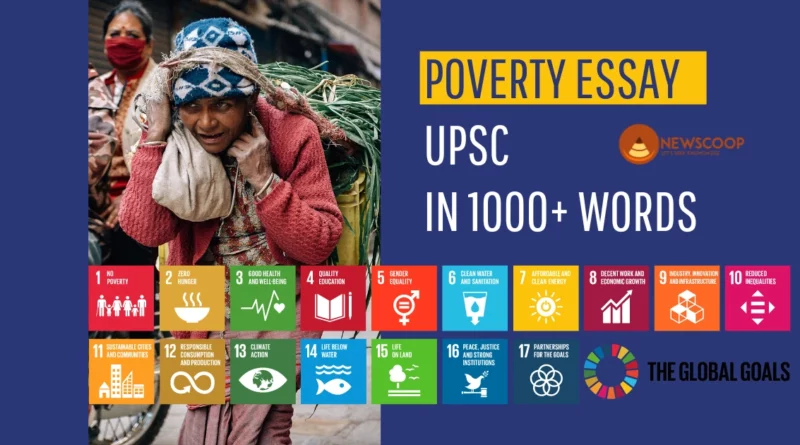Essay on Poverty | UPSC in 1000+ Words
This essay provides an in-depth analysis of the issue of poverty in India. The essay is divided into several sections, each focusing on different aspects of poverty in India.
The first section examines the causes of poverty in India, including lack of access to education, healthcare, and job opportunities. The second section discusses the impact of poverty on various aspects of society, such as health, education, and gender inequality. The third section of the essay focuses on government initiatives aimed at addressing poverty in India. It highlights various poverty alleviation programs and schemes such as MGNREGA, PMAY, and NFSA.
The fourth section examines the impact of these initiatives on poverty reduction in India, highlighting the success stories and challenges faced. The final section discusses the challenges that persist in addressing poverty in India, such as corruption, limited resources, inadequate implementation, and lack of political will.
Overall, the essay provides a comprehensive understanding of poverty in India, the government’s efforts to alleviate it, and the challenges that remain in the fight against poverty.
Poverty is one of the most pressing and pervasive issues facing the world today. It is a multifaceted and complex problem that affects millions of people worldwide, including India. Poverty is defined as a lack of access to basic human needs, such as food, shelter, clothing, and healthcare. It is often accompanied by social exclusion, low educational attainment, and limited job opportunities.
The Extent of Poverty in India
India is a developing country with a population of over 1.3 billion people, and poverty is a significant challenge facing the nation. According to the World Bank, around 60% of India’s population lives on less than $3.20 a day, making it one of the world’s poorest countries. Poverty is particularly acute in rural areas, where almost 80% of the country’s poor live.
Causes of Poverty
Poverty in India is caused by a combination of factors, including:
Lack of access to education: A lack of education is a significant contributor to poverty in India. Without education, individuals lack the necessary skills and knowledge to obtain well-paying jobs or start businesses.
Limited job opportunities: Job opportunities in India are limited, particularly in rural areas. This limits individuals’ ability to earn a decent income and leads to high levels of unemployment.
Income inequality: Income inequality is a significant contributor to poverty in India. Wealth is concentrated in the hands of a small number of individuals, while the majority of the population struggles to make ends meet.
Gender inequality: Gender inequality is a significant contributor to poverty in India. Women face discrimination in many areas of life, including education, employment, and healthcare, which limits their ability to earn a decent income and improve their living standards.
Poor healthcare: Poor healthcare is a significant contributor to poverty in India. Without access to quality healthcare, individuals are more likely to fall ill and suffer from chronic diseases, which can limit their ability to work and earn a decent income.
Lack of access to basic infrastructure: A lack of access to basic infrastructure, such as electricity, water, and sanitation, is a significant contributor to poverty in India. Without these essential services, individuals are less productive, and their quality of life is reduced.
Government Initiatives to Address Poverty
The Indian government has implemented several initiatives to address poverty, including:
- National Rural Employment Guarantee Act (NREGA): The National Rural Employment Guarantee Act (NREGA) guarantees 100 days of wage employment per year to every rural household in India. This initiative has helped to provide job opportunities to millions of individuals in rural areas and has reduced poverty.
- Pradhan Mantri Jan Dhan Yojana (PMJDY): The Pradhan Mantri Jan Dhan Yojana (PMJDY) is a government initiative aimed at providing access to financial services to all households in India. This initiative has helped to provide financial assistance to millions of individuals and has reduced poverty.
- Swachh Bharat Abhiyan: The Swachh Bharat Abhiyan is a government initiative aimed at improving the cleanliness and sanitation of India’s cities and rural areas. This initiative has helped to improve the quality of life of millions of individuals and has reduced poverty.
- National Health Mission (NHM): The National Health Mission (NHM) is a government initiative aimed at providing affordable and accessible healthcare to all individuals in India. This initiative has helped to improve the health and well-being of millions of individuals and has reduced poverty.
- Pradhan Mantri Fasal Bima Yojana (PMFBY): The Pradhan Mantri Fasal Bima Yojana (PMFBY) is a government initiative aimed at providing crop insurance to farmers in India. This initiative has helped to improve the financial stability of farmers and has reduced poverty in rural areas.
Challenges in Addressing Poverty
Despite the government’s efforts to address poverty, several challenges persist, including:
- Corruption: Corruption is a significant challenge facing India and undermines the effectiveness of government initiatives aimed at addressing poverty. Corruption reduces the effectiveness of poverty alleviation programs by diverting funds away from their intended purpose.
- Limited resources: India is a developing country with limited resources, and addressing poverty requires significant investments in infrastructure, education, healthcare, and job creation. Limited resources can constrain the government’s ability to address poverty effectively.
- Inadequate implementation: The success of government initiatives to address poverty is heavily dependent on their effective implementation. Inadequate implementation can limit the effectiveness of poverty alleviation programs and prevent them from reaching their intended beneficiaries.
- Lack of political will: Addressing poverty requires sustained political will and commitment from government officials. Without this commitment, poverty alleviation programs may be underfunded or abandoned altogether.
Conclusion
Poverty is a significant challenge facing India, and addressing it requires a sustained and comprehensive effort. The government has implemented several initiatives aimed at addressing poverty, including job creation, financial assistance, improved healthcare, and sanitation. However, several challenges persist, including corruption, limited resources, inadequate implementation, and a lack of political will.
Addressing these challenges requires sustained political will and a commitment to addressing poverty at all levels of government. Only then can India achieve its goal of reducing poverty and improving the quality of life for all its citizens.
Thank You!

